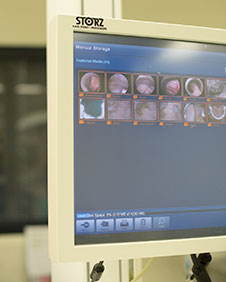What is polycystic ovarian syndrome?
This may be broadly described as follows – the presence of polycystic ovaries on pelvic ultrasound examination associated with one or more of the following:
- The inability to consistently release an egg at mid-cycle which generally manifests as irregular menses or an inability to conceive.
- Elevated blood levels of the so-called ‘male type’ hormones or androgens.
- The symptoms and signs of androgen excess such as acne and excessive hair growth on areas such as the face.
Is it common?
Estimates range between 5 – 20% of women.
Do all women with polycystic ovaries have polycystic ovarian syndrome?
No. it is worth noting that the presence of polycystic ovaries on scan alone, does not establish the diagnosis of the syndrome itself. Some 20% of women with polycystic ovaries on scan will not exhibit any symptoms or signs of the syndrome.
What causes PCOS?
No one knows the exact cause. There may be genetic link in some instances. Many patients with PCOS have a weight problem and much of the current research has focused on the relationship of PCOS and the body’s ability to make insulin. Since some women with PCOS make too much insulin, it is possible that the ovaries by putting out excessive amounts of ‘male type’ hormones called androgens. This can lead to acne, excessive hair growth, weight gain and ovulation problems.
Which tests are used to diagnose polycystic ovarian syndrome (PCOS)?
There is no single test to diagnose PCOS. Your doctor will take a medical history and perform an examination, which will include an ultrasound of the pelvis and then go on and check hormone and sugar levels in the blood. If you are producing excessive amounts of male hormones, your doctor will have to make sure that causes other than PCOS are excluded.
How is polycystic ovarian syndrome (PCOS) treated?
Because there is no cure for PCOS, management is tailored according to the presenting problem. There is no quick fix solution. Patients need to adhere to instructions in order to achieve the best results.
Weight control
Since many patients with PCOS are overweight or obese the importance of weight control cannot be over emphasised. This can only be achieved by healthy eating and exercise and it may sometimes be necessary to consult a specialised dietician and fitness expert. Apart from weight control other treatments are prescribed according to the patient’s symptoms and whether or not she wants to conceive or needs contraception.
Birth control pills
For women who don’t want to become pregnant, birth control pills can control menstrual cycles, reduce male hormone levels and help to clear acne. However, the birth control pill does not cure PCOS. The menstrual cycle may become abnormal again if the pill is stopped. Women may also think about taking a pill that has only progesterone, like Provera, to regulate the menstrual cycle and prevent endometrial problems. But progesterone alone does not help reduce acne and hair growth.
Insulin lowering medication
The medicine Metformin may be prescribed if the fasting insulin is elevated. Metformin affects the way insulin regulates glucose, metabolism and decreases testosterone production. Abnormal hair growth will slow down and ovulation may return after a few months of use. There may be side effects associated with Metformin therapy but these can be avoided by adhering to your doctor’s instructions.
Fertility medications
The main fertility problem for women with PCOS is the lack of egg production. Even so other causes for infertility may need to be ruled out before fertility medications are used. Fertility medication such as Clomid pills are not the end-all or be-all of fertility treatment and should only be used:
A) After a reasonable degree of weight control has been achieved and elevated insulin levels have been controlled with Metformin.
B) If despite the above measures regular ovulation has not been achieved.
Treatment of increased hair growth or extra ‘male type’ hormones
If a woman is not trying to conceive, there are some useful medicines and measures to reduce hair growth and acne:
- Combined birth control pills such as Diane, Yasmin or their generic equivalents.
- There may be combined with androcur or spironolactone if the doctor deems it necessary.
- Non-medical treatments such as electrolysis or laser hair removal are effective at getting rid of hair.
Surgery
Surgery for the management of PCOS is seldom if ever resorted to these days and cannot be recommended except if indicated for reasons other than those pertaining to PCOS.
Long term effects of PCOS
Whilst this booklet may have placed greater emphasis on the short term gynaecological impact of PCOS it is well worth noting some of the longer term consequences:
- An increased incidence of endometrial carcinoma and hyperplasia especially in patients with prolonged menstrual cycles (infrequent menses).
- An increase in the incidence of diabetes, hypertension and abnormal lipid profiles which in turn predispose to medical conditions such as strokes and ischemic heart disease.
Prepared by: Dr M Pillay

